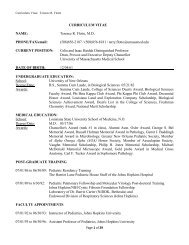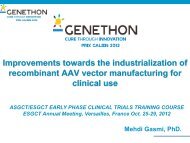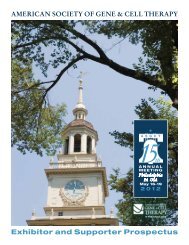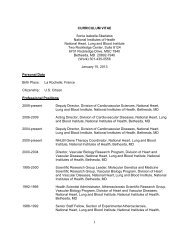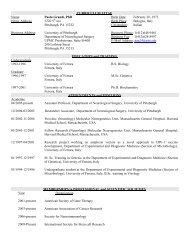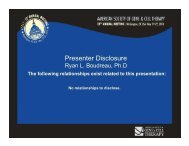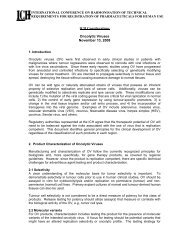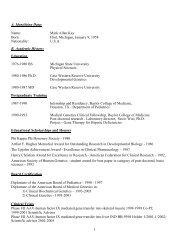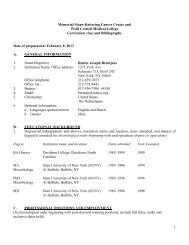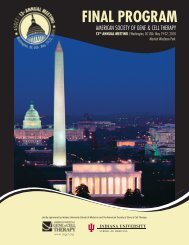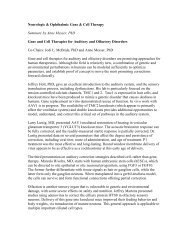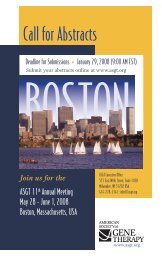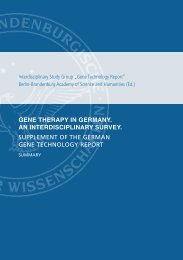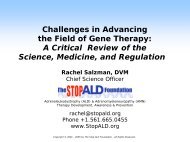Final Program - American Society of Gene & Cell Therapy
Final Program - American Society of Gene & Cell Therapy
Final Program - American Society of Gene & Cell Therapy
You also want an ePaper? Increase the reach of your titles
YUMPU automatically turns print PDFs into web optimized ePapers that Google loves.
<strong>Program</strong> Schedule, Wednesday, May 15, 2013<br />
Wednesday, May 15, 2013<br />
Education Session 113<br />
10:30 am - 12:00 pm<br />
ROOM: 150 DEFG<br />
Topical Review: <strong>Gene</strong> and <strong>Cell</strong> <strong>Therapy</strong> Approaches to Hemoglobinopathies<br />
This session will introduce basic, translational and clinical efforts to provide therapeutic advances for the two major Hemoglobinopathies:<br />
sickle-cell anemia (SCD) and beta-thalassemia’s using gene therapy approaches. Elevation <strong>of</strong> HbF production has been a long-standing<br />
goal <strong>of</strong> therapy for ß-thalassemia and sickle cell disease (SCD) as its expression provides a potent attenuation <strong>of</strong> many <strong>of</strong> the most severe<br />
complications <strong>of</strong> disease phenotype. The central theme <strong>of</strong> this session will be improving gene transfer and gene correction in human<br />
hematopoietic stem and progenitor cells to provide more effective and safe therapies for blood cell disorders. In addition, efforts and the<br />
lessons learnt from gene therapy <strong>of</strong> Severe Combined Immunodeiciency (SCID) disease.<br />
CO-CHAIRS: Pankaj Qasba, PhD and Sonia I. Skarlatos, PhD<br />
SPEAKERS<br />
Punam Malik, MD, PhD<br />
<strong>Gene</strong> and <strong>Cell</strong> <strong>Therapy</strong> Approaches to Hemoglobinopathies<br />
Dr. Malik will present an overview <strong>of</strong> genetic therapies for hemoglobiniopathies, a review <strong>of</strong> the literature, the current state <strong>of</strong> the<br />
ield and future promising ways <strong>of</strong> gene editing and reprogramming.<br />
John F. Tisdale, MD<br />
Stem <strong>Cell</strong>s as <strong>Gene</strong> <strong>Therapy</strong> Vehicles for the Treatment <strong>of</strong> Disorders <strong>of</strong> Globin Synthesis<br />
Sickle cell disease (SCD) is a recessive genetic disease that results from the production <strong>of</strong> an abnormal hemoglobin that is prone<br />
to polymerization upon deoxygenation causing severe morbidity and early mortality. Although palliative therapies have been<br />
developed, conventional treatment remains unsatisfactory. Signiicant advances in cellular and molecular biology have enabled<br />
the development <strong>of</strong> a mounting armamentarium <strong>of</strong> tools to allow correction at the hematopoietic stem cell (HSC) level. Allogeneic<br />
HSC transplantation, a form <strong>of</strong> genetic therapy, is an established curative approach through replacement <strong>of</strong> the defective organ<br />
with that <strong>of</strong> a donor carrying the normal genotype; however, procedural toxicities limit this approach to only severely affected<br />
children. Nonmyeloablative approaches based upon basic and preclinical studies have now allowed for the successful application<br />
<strong>of</strong> this approach in adults with severe disease, with disease reversion in the majority <strong>of</strong> patients treated through the attainment <strong>of</strong><br />
stable mixed hematopoietic chimerism. Nonetheless, this approach remains limited by donor availability, and the development <strong>of</strong><br />
gene transfer directed at autologous HSCs remains a desirable alternative. Approaches using autologous transplantation <strong>of</strong> HSCs<br />
modiied by lentiviral vectors have demonstrated expression <strong>of</strong> the human beta-globin protein at clinically signiicant levels, and<br />
this approach is now being developed for clinical application in SCD. The progress toward the goal <strong>of</strong> these HSC based therapies will<br />
be reviewed.<br />
Donald B. Kohn, MD<br />
Lessons Learned from <strong>Gene</strong> <strong>Therapy</strong> for SCID<br />
The implementation and performance <strong>of</strong> clinical trials <strong>of</strong> gene therapy using hematopoietic stem cells is a complex process. After<br />
pro<strong>of</strong>-<strong>of</strong>-principle studies demonstrate potential disease modifying activity, preclinical activity and toxicology data need to be<br />
generated, along with clinical protocol, consent documents, etc. to support regulatory applications. Subjects are treated in the<br />
high acuity setting <strong>of</strong> hematopoietic stem cell transplantation (HSCT) which may include the use <strong>of</strong> myeloreductive conditioning,<br />
although no immune suppression pre- or post-transplant is needed, due to the use <strong>of</strong> autologous cells. Ultimately, clinical<br />
acceptance <strong>of</strong> gene therapy as a standard <strong>of</strong> care will depend on demonstrating equivalent or greater eficacy and improved<br />
outcomes or reduced costs, compared to allogeneic HSCT. Experience with gene therapy for severe combined immune deiciency<br />
may inform efforts to develop similar approaches to hemoglobinopathies; persistence and patience are needed.<br />
Education Session 114<br />
10:30 am - 12:00 pm<br />
ROOM: 151 ABCG<br />
Topical Review: Vector Design<br />
CO-CHAIRS: Alberto Auricchio, MD and Dirk Grimm, PhD<br />
38<br />
<strong>Final</strong> <strong>Program</strong> SALT LAKE CITY, UTAH May 15–18, 2013



